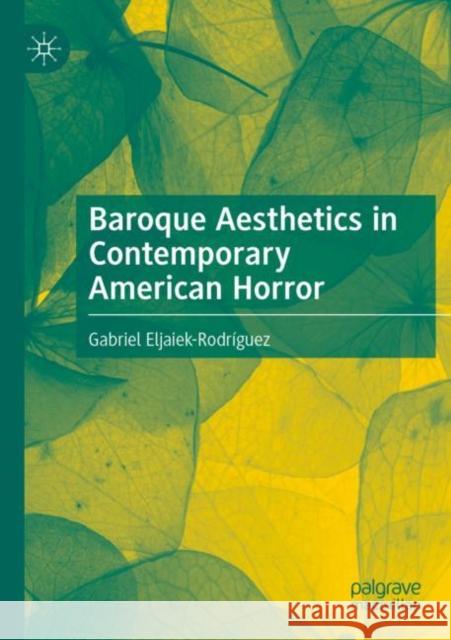Baroque Aesthetics in Contemporary American Horror » książka
Baroque Aesthetics in Contemporary American Horror
ISBN-13: 9783030882532 / Angielski / Miękka / 2022 / 179 str.
Baroque Aesthetics in Contemporary American Horror
ISBN-13: 9783030882532 / Angielski / Miękka / 2022 / 179 str.
(netto: 421,70 VAT: 5%)
Najniższa cena z 30 dni: 424,07
ok. 16-18 dni roboczych.
Darmowa dostawa!
This book traces a trend that has emerged in recent years within the modern panorama of American horror film and television, the concurrent—and often overwhelming—use of multiple stock characters, themes and tropes taken from classics of the genre.American Horror Story, InsidiousandThe Conjuringare examples of a filmic tendency to address a series of topics and themes so vast that at first glance each taken separately would seem to suffice for individual films or shows. This book explores this trend in its visible connections with American Horror, but also with cultural and artistic movements from outside the US, namely Baroque art and architecture, Asian Horror, and European Horror. It analyzes how these hybrid products are constructed and discusses the socio-political issues that they raise. The repeated and excessive barrage of images, tropes and scenarios from distinct subgenres of iconic horror films come together to make up an aesthetic that is referred to in this book asBaroque Horror. In many ways similar to the reactions provoked by the artistic movement of the same name that flourished in the XVII century, these productions induce shock, awe, fear, and surprise. Eljaiek-Rodríguez details how American directors and filmmakers construct these narratives using different and sometimes disparate elements that come together to function as a whole, terrifying the audience through their frenetic accumulation of images, tropes and plot twists. The book also addresses some of the effects that these complex films and series have produced both in the panorama of contemporary horror, as well as in how we understand politics in a divisive world that pushes for ideological homogenizations.
This book traces a trend that has emerged in recent years within the modern panorama of American horror film and television, the concurrent—and often overwhelming—use of multiple stock characters, themes and tropes taken from classics of the genre. American Horror Story, Insidious and The Conjuring are examples of a filmic tendency to address a series of topics and themes so vast that at first glance each taken separately would seem to suffice for individual films or shows. This book explores this trend in its visible connections with American Horror, but also with cultural and artistic movements from outside the US, namely Baroque art and architecture, Asian Horror, and European Horror. It analyzes how these hybrid products are constructed and discusses the socio-political issues that they raise. The repeated and excessive barrage of images, tropes and scenarios from distinct subgenres of iconic horror films come together to make up an aesthetic that is referred to in this book as Baroque Horror. In many ways similar to the reactions provoked by the artistic movement of the same name that flourished in the XVII century, these productions induce shock, awe, fear, and surprise. Eljaiek-Rodríguez details how American directors and filmmakers construct these narratives using different and sometimes disparate elements that come together to function as a whole, terrifying the audience through their frenetic accumulation of images, tropes and plot twists. The book also addresses some of the effects that these complex films and series have produced both in the panorama of contemporary horror, as well as in how we understand politics in a divisive world that pushes for ideological homogenizations.











